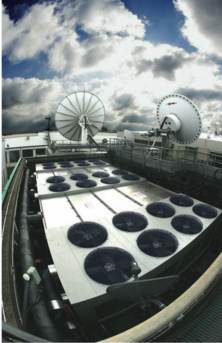BSkyB minimises risk of refrigerant leakage

These Star Indigochillers have been installed at BSkyB’s headquarters in London to minimise the leakage of refrigerant.
Star Refrigeration has now completed the installation of an Indigochiller cooling system to serve the headquarters of BSkyB in London. The Indigochiller uses R134a and has electromagnetic bearings in the compressor to eliminate the leakage of refrigerant. It was development in direct response to proposed F-gas regulations. Three Indigochillers produce chilled water and were installed to replace existing packaged chillers in a compound between the Sky Sports and Sky News buildings. Star combined two existing independent chilled-water circuits serving both buildings into a common system, boosting operating efficiency. A carefully phased 4-week installation programmed ensured no disruption to broadcast operations. Temporary chillers were installed while the existing chillers were removed to make way for the Indigochillers. As well as the electromagnetic bearings in the compressor to minimise refrigerant leakage, each chiller has a welded plate and shell heat exchanger, sealed expansion valve and welded steel pipework. Leak-detection requirements have been reduced to a few simple checks. These chillers have cooling capacities from 250 to 1500 kW. They are air cooled and offered with noise levels of 61 and 53 dB(A) at 10 m. Following the success of this project, two more units have been installed on the same site and three at BSKYB’s offices in Dunfermline.
Related links:


